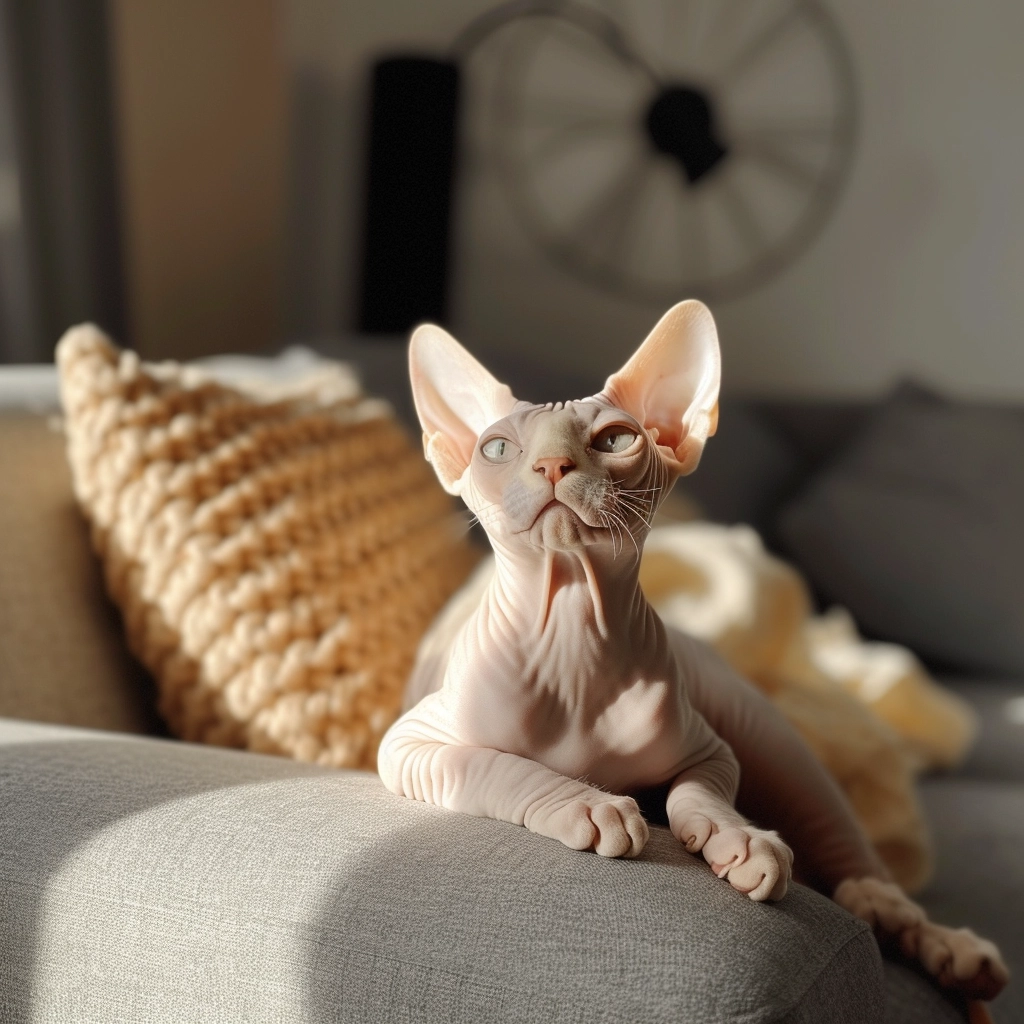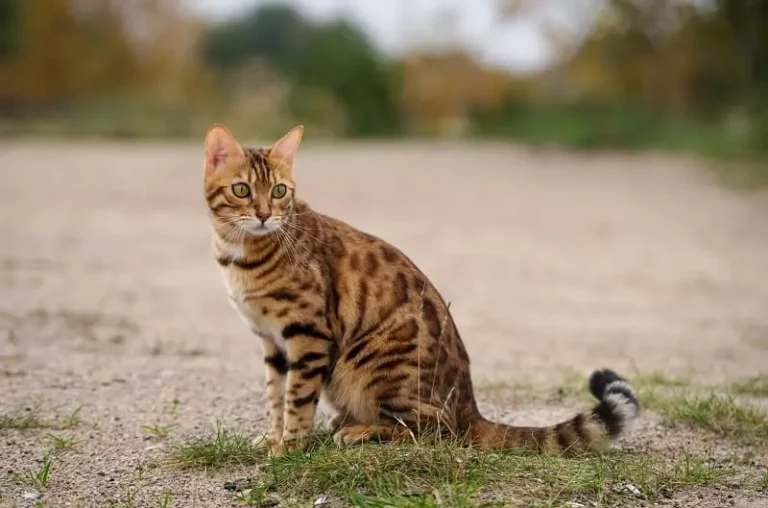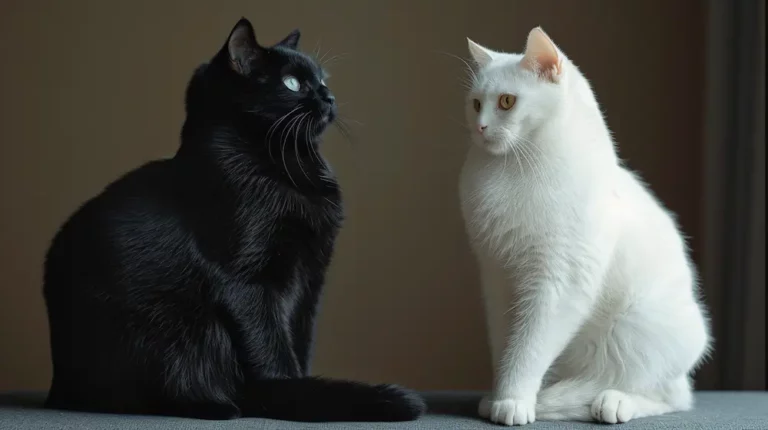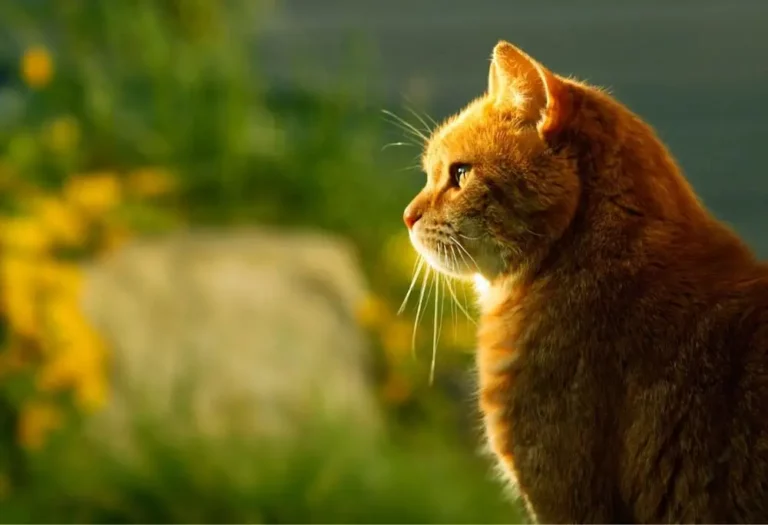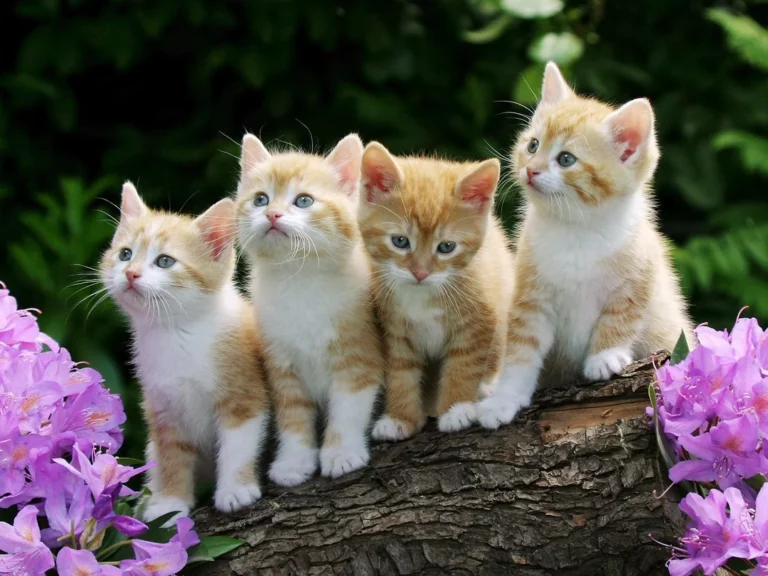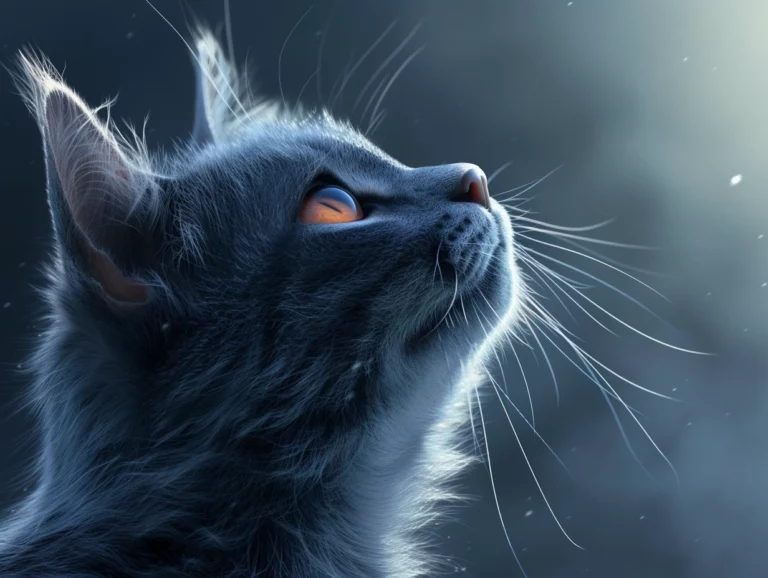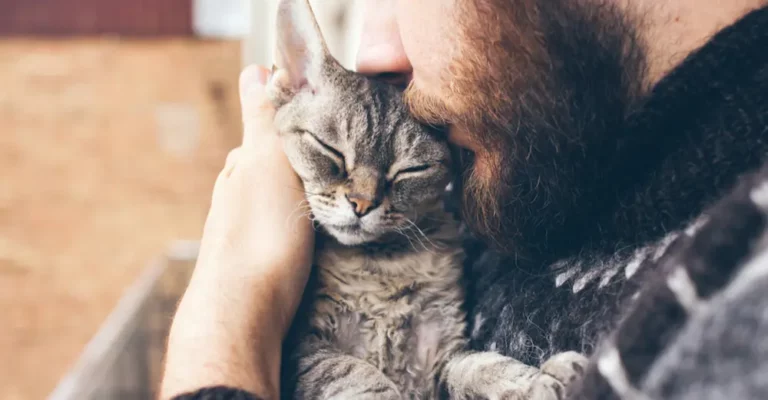Everything You Need To Know About Sphynx Cats
Have you ever considered that the perfect pet might not have a fluffy coat?
Enter the Sphynx
While these cats offer a hypoallergenic option for allergy sufferers, they come with their own set of care requirements that might surprise you.
Choosing a Sphynx
Their playful nature and affectionate demeanor can fill a home with joy, but their care demands a commitment that’s not suited for everyone.
This article dives into the pros and cons of owning a Sphynx
Whether you’re drawn to their low-shedding coats or curious about what it takes to keep them healthy and happy, you’ll find valuable information here to guide your decision.
Understanding Sphynx Cats
Origin and Breed History
Diving into the history of Sphynx cats, it’s a tale that starts in the 20th century.
The lineage that led to the cats we now know and love kicked off with a spontaneous mutation in Toronto, Canada, in 1966.
This mutation, a single hairless kitten named Prune, marked the beginning of the breed.
Crossing Prune with its mother, breeders aimed to create a genetically viable line. They encountered numerous challenges, including health issues and public skepticism.
Fast forward a bit, and breeders in Europe and North America took notice, contributing to the breed’s development by introducing new genetic lines.
This was crucial for avoiding the health pitfalls that come with a narrow gene pool.
They crossbred Sphynxes with Devon Rex cats, another breed known for their low coat.
This ensured a stronger, healthier breed.
Hence, if you’re pondering over the choice of a Sphynx
It’s an try that reflects dedication and love for this unique breed.
Distinctive Physical Traits
Sphynx cats, with their hairless bodies, often draw double-takes and curious glances.
Their skin feels like warm suede, and it’s this lack of fur that defines much of their care and the unique bond they share with their humans.
They’re almost like personal hot water bottles that purr, especially delightful in colder months.
Yet, their physical uniqueness doesn’t end with their skin.
They have large, lemon-shaped eyes that seem to peer right into your soul, ears that could pick up satellite signals (not really, but they’re impressively large!), and a muscular build that’s often hidden under those delightful wrinkles.
Each Sphynx is a living sculpture, a testament to the breed’s elegance and distinctiveness.
Also, their color and patterns are as varied as in any furred breed—just displayed directly on their skin! From solid colors to intricate patterns, every Sphynx wears a unique coat of… well, skin.
Caring for such distinctive creatures, hence, requires a nuanced approach.
Bathing becomes a regular part of the routine, not for cleanliness alone but to remove the oils that their skin produces in excess.
It’s a bonding ritual that you and your Sphynx will share, illuminating another facet of their need for human interaction.
The Temperament of Sphynx Cats
Sociability and Behavior
When I talk about the sociability and behavior of Sphynx cats, it’s akin to discussing the charm of a curious toddler.
These cats, with their intelligence rating of 4.5, are inquisitive and naturally curious.
They are always on the lookout for adventure or a new trick to learn.
This makes them quite engaging pets, but it also means they require constant mental stimulation.
Puzzle feeders and interactive toys become essential tools in keeping a Sphynx entertained.
But, their affectionate nature, also scoring a 4.5, means they thrive on interaction.
They aren’t just pets; they’re family members who want to be involved in everything you do.
Whether you’re cooking dinner or settling down to watch TV, your Sphynx will likely want to be by your side.
And while they may not always appreciate being picked up, they certainly won’t say no to a cozy lap to sit on.
But, it’s their independence score of 2.5 that you’ll find most intriguing.
Even though their high intelligence and affectionate demeanor, Sphynx cats don’t do well when left alone for long periods.
They crave attention and companionship, making them less of an ideal choice if you’re away from home often.
Hence, it’s wise to ensure they have company, be it human or another pet, to keep their spirits up.
Compatibility with Other Pets and Children
Let’s discuss how well Sphynx cats blend into homes with other pets or children.
With a family-friendly score of 3.5, they can adapt well to living with others, provided introductions are handled carefully.
My experience has taught me the value of slow, supervised introductions.
For instance, when I introduced my Sphynx, Mr. Wrinkles, to our family dog, I made sure each had its safe space.
Initially, there were separate feeding areas and plenty of places to retreat if needed.
Over time, they developed a mutual understanding and respect.
Similarly, Sphynx cats can form deep bonds with children who learn to treat them with kindness and respect.
Their playful nature, scoring a 4.5, makes them excellent companions for energetic kids.
They can chase laser pointers or bat at strings for hours.
But, it’s crucial to educate children on how to handle these delicate pets gently.
Sphynx cats are robust but dislike rough handling, a good lesson in empathy and care for young ones.
Grooming and Care for Sphynx Cats
Caring for a Sphynx
Their unique physique requires specific grooming and environmental adjustments to maintain their well-being.
Here’s my detailed guide on keeping your Sphynx
Skin Care Essentials
First off, let’s talk about the biggest task: skin care.
Unlike their furry counterparts, Sphynx cats don’t have hair to absorb oils on their skin, which means they can get oily pretty quickly.
I recommend weekly baths with a mild,
Imagine them as a little baby that needs gentle care; that’s exactly how you should treat your Sphynx during bath time.
Moisturizing is also key.
After a bath, applying a pet-safe moisturizer can help prevent dryness, keeping their skin supple and healthy.
Make sure whatever product you use is safe if ingested since cats are notorious groomers.
Don’t forget the ears and nails.
Their ears can accumulate more wax and debris due to the lack of hair, requiring regular cleaning.
As for their nails, a routine trim will do, along with cleaning the nail beds to prevent buildup.
Exercise and Environmental Needs
Sphynx cats are lively and love to play, making exercise an essential part of their care.
I always ensure a variety of toys to stimulate their inquisitive minds and keep them physically active.
Think of interactive toys, like laser pointers or wand toys, which not only entertain them but also provide a bonding opportunity for us.
But, it’s not all about play.
Their environment needs to be carefully regulated.
Due to their lack of fur, Sphynx cats are sensitive to temperature extremes.
In the winter, my house is kept warm, and I even offer them cozy blankets or sweaters to snuggle into.
Conversely, during hot summers, I make sure they have a cool spot to retreat to, away from direct sunlight, and I always keep the air conditioner or fans running.
Besides, I’ve discovered that Sphynx cats cherish their safe spaces.
Offering them a warm, secluded spot, like a soft bed in a quiet room, allows them to rest and recharge comfortably.
To conclude, while the grooming and care for Sphynx cats might seem daunting at first, it quickly becomes a routine part of life.
Their affectionate nature and playful demeanor more than make up for the extra care they require.
Remember, a well-cared-for Sphynx
Health and Wellbeing of Sphynx Cats
Ensuring the health and wellbeing of Sphynx cats is something I take to heart.
These unique creatures, with their hairless appearance and endearing personalities, require specific care to thrive.
Hence, it’s imperative to understand the prevalent health issues they face and how nutrition and diet play a pivotal role in their overall health.
Prevalent Health Issues
Sphynx cats, while sturdy and resilient, are prone to certain health issues due to their distinctive genetic makeup and physical characteristics.
Skin problems, such as sunburn, acne, and fungal infections, are common due to their lack of fur.
Hence, regular skin care, including bathing and moisturizing, is essential to keep their skin healthy.
I always recommend using a vet-approved, fragrance-free moisturizer to avoid any skin irritation.
Also, Sphynx cats can be prone to obesity if their diet isn’t managed carefully.
A sedentary lifestyle combined with overfeeding can quickly lead to weight gain, so I emphasize portion control and regular playtime to keep them active and engaged.
Also, heart conditions such as Hypertrophic Cardiomyopathy (HCM) are notable concerns in the breed, underscoring the importance of regular vet check-ups and echocardiograms.
Nutrition and Diet Considerations
Nutrition plays a crucial role in the health and vitality of Sphynx cats.
Given their high metabolism and active nature, a diet rich in high-quality proteins is paramount.
I always look for
This practice ensures that my Sphynx is getting the energy it needs without the unnecessary fillers or by-products.
Hydration is equally important. Sphynx cats require constant access to fresh water to support their skin health and prevent dehydration.
I’ve found that having a
Besides, cleaning their water bowls regularly is a practice I never skip, as it guarantees the water they consume is always fresh and clean.
To sum it up, balancing high-quality nutrition with regular health checks and being mindful of the specific needs of Sphynx cats can significantly impact their wellbeing.
I’ve learned that it’s not just about loving these extraordinary pets but also about providing them with the care and attention their unique condition requires.
By doing so, I’ve been able to ensure that my Sphynx
Sphynx Cat Pros and Cons
Below, I’ll break down the pros and cons of owning a Sphynx
The Pros: Affectionate Companions
One of the most remarkable traits of Sphynx cats is their affectionate nature.
These cats thrive on interaction and form strong bonds with their owners. Imagine coming home to a warm, purring companion eager for your touch—this is the reality with a Sphynx.
They’re known to follow their owners around, participate in activities, and even snuggle under the covers at night.
Also, Sphynx cats are often compared to dogs in terms of their loyalty and affectionate behavior.
They’re excellent companions for someone who works from home or desires an interactive pet. Their expressive eyes and cuddly nature can brighten up any day.
Also, for families with allergy concerns, Sphynx cats are often a good choice as they produce fewer allergens than their furry counterparts.
The Cons: Intensive Grooming and Health Concerns
But, owning a Sphynx
Due to their lack of fur, Sphynx cats require frequent bathing to remove the oil buildup on their skin, typically around once a week.
I’ve found it helpful to establish a regular grooming routine to keep my Sphynx healthy and comfortable.
This involves not just baths but also regular ear cleaning and nail clipping, tasks that not all pet owners may be prepared for.
Health-wise, Sphynx cats can be prone to certain conditions like hypertrophic cardiomyopathy, a heart disease, and skin issues.
Hence, it’s crucial to have them regularly checked by a vet.
Regular check-ups can help detect any signs of heart disease early.
As for their skin, it’s essential to provide protection from the sun to avoid burns and ensure they’re not exposed to extreme temperatures, considering their lack of fur for insulation.
On the topic of their diet, obesity is another concern.
These cats have a hearty appetite, so monitoring their food intake and ensuring they get enough exercise is key.
I’ve found interactive toys and climbing structures to be excellent for keeping my Sphynx active and engaged indoors.
While the grooming and health care might sound intensive, preparing and committing to these needs will ensure your Sphynx
And in return, you’ll receive the unconditional love and companionship that only a Sphynx
The journey with a Sphynx
If you’re up for the task, the rewards are truly remarkable.
Adoption and Ownership Considerations
Choosing to bring a Sphynx
Their distinctive appearance and vibrant personality come with unique challenges and rewards.
Let’s investigate into some critical aspects you should consider, ensuring your journey with a Sphynx
Choosing a Reputable Source
When it comes to welcoming a Sphynx into your life, your very first step should be finding a reputable breeder or adoption center.
Unfortunately, the uniqueness of these cats can attract less-than-reputable sources looking to make a quick profit without concern for their health or well-being.
A responsible breeder will not only provide health certificates for heart conditions like hypertrophic cardiomyopathy, which Sphynxes are prone to but also offer a glimpse into the kitten’s social upbringing.
They should be able to answer all your questions, from diet to specific care needs.
Besides, they’ll show genuine interest in where their cats are going, often asking you questions to ensure a good match.
Adoption centers may also have Sphynx cats looking for a forever home.
While less common, adopting from a shelter provides a Sphynx
Whichever route you choose, prioritize sources that demonstrate care and knowledge about their animals.
Long-Term Commitment and Costs
Owning a Sphynx
It’s a long-term commitment requiring not just your time and affection but also a financial investment.
First, there’s the upfront cost, which can be significant, but the ongoing costs of ownership can add up too.
Routine vet check-ups are crucial to monitor their health, especially given their predisposition to certain conditions.
Don’t forget the additional grooming necessities.
Unlike other cats, Sphynxes need regular bathing to remove oil buildup on their skin, and they often require specialized skincare products to keep their skin healthy.
Another cost that can sneak up on you is creating a climate-controlled environment for your Sphynx.
Keeping your home warm enough for a hairless
Plus, investing in heated beds or blankets ensures your Sphynx stays comfortable.
But, the rewards of Sphynx
Their affectionate, playful nature, and unique companionship often outweigh the costs and effort required to care for them.
As you begin on this journey, prepare to be constantly entertained and loved unconditionally by your new furry friend.
Frequently Asked Questions
What is the average price for a Sphynx cat ?
The price for a pedigree Sphynx
For Sphynx cats from top breeders with desirable traits, prices can run between $3,500 and $6,000, and exceptionally rare specimens may cost up to $10,000.
Do Sphynx cats scratch furniture?
Like all cats, Sphynx cats have a natural urge to scratch for claw maintenance and territory marking.
Without appropriate scratching posts, they may resort to scratching furniture.
It’s advisable to provide tall scratching posts for them to stretch and scratch vertically.
How often do you bathe a Sphynx?
Sphynx cats require regular bathing approximately once a week.
This regimen helps remove the buildup of oils on their skin, preventing blackheads and acne.
Use warm water and a hypo-allergenic shampoo for their sensitive skin.
How much should I pay for a Sphynx cat ?
When adopting, costs can range from $30 to $300.
Purchasing from a reputable breeder can significantly increase the price, from $1,500 to $6,000.
The cost varies based on the
Do Sphynx cats smell?
While clean Sphynx cats may have an unusual earthy smell, they’re known to develop a stronger odor if not bathed regularly.
Their lack of fur means bacteria, yeast, and other substances can build up on their skin, necessitating frequent baths.
Conclusion
Owning a Sphynx
From their distinct appearance to their warm personalities, they’re not just pets but companions that fill your home with love.
I’ve learned that while they do require a bit more care and a commitment to their health and well-being, the joy they bring is immeasurable.
Sure, the initial steps of finding a reputable breeder or adoption center, along with the ongoing costs of grooming and vet visits, might seem daunting.
Yet, when I weigh these against the affection and quirky antics of my Sphynx, it’s all worth it.
They’re more than just cats; they’re family members who ask for love in their own special way.
So if you’re ready for the responsibility, a Sphynx
